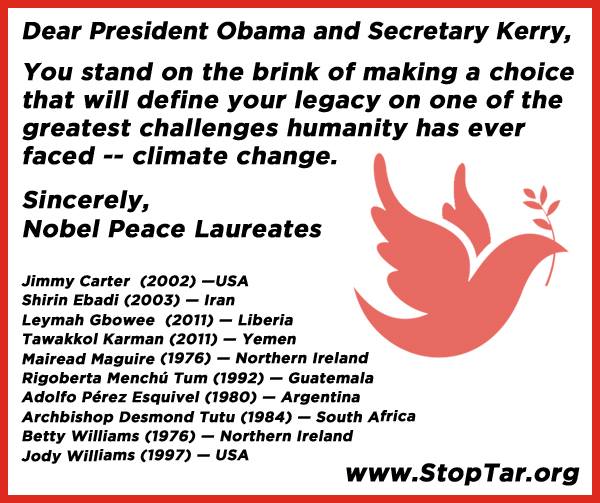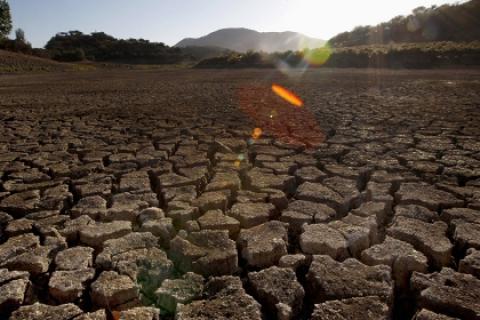More disturbing than any horror movie, Showtime's Years of Living Dangerously, a nine-part series about climate change that premiered last night, is essential viewing. The series documents the far-reaching consequences of climate change, and nothing, we're shown - no person, no industry, no institution; no job, no religion, no nation - is exempt from the effects of climate change.
Living Dangerously is the latest environmental klaxon, bringing together star power (The premiere episode opens with Harrison Ford flying a reconfigured-for-science fighter plane to gather pollution data), money (James Cameron, Arnold Schwarzenegger and Jerry Weintraub are executive producers), and smarts (The Guardian calls the series's experts "the best science team you could imagine"). Like Showtime's last serial documentary, Oliver Stone's Untold History of the United States, in which historical revelations practically guaranteed that viewers would emerge boiling mad about how the twentieth century unfolded, Living Dangerously will make you boiling mad about the climate calamity that awaits us in the twenty-first.
But that's sort of the point. This is must-see TV, and in just the first ten minutes, you'll hear enough pessimistic quotables to fill this entire post. It's hard to ignore that pessimism. "The world is going to be suffering in a lot of ways from this physical reality for a long time to come," NASA scientist Laura Iraci tells Ford. Note that there's no conditional in her warning. Our environmental crisis has progressed beyond "might" and "probably" to "is" and "will." Dahr Jamail outlined this awful inevitability here in December. Ford, while looking at frightening data and satellite imagery at a NASA lab in Northern California, asks, "This is actual data, not a projection?" The devastating answer, courtesy of Dr. Rama Nemani, is a simple "Yes."
As Don Cheadle, another participant, points out in the episode, climate change is engendering yet another "Two Americas" situation - namely, those (primarily coastal) who are genuinely concerned about the crisis, and those who aren't, despite the very real effects climate change is having on their communities (representatives of whom Cheadle finds in Texas). Living Dangerously is a necessary tool to address this disconnect, to make plain the connections between deforestation in Indonesia and job losses in American agriculture, between record heat and mothballed factories. The days of resignation, of chalking things up to acts of god, to "how it's always been," are over, the series explains; we, as citizens of the planet, need to act.
Yet despite the doomsday scenarios described, the series is itself an article of hope. It's easy to look at the numbers, read the analyses and draw the conclusion that, in fact, all is lost, that there's no point in even making an effort. ("Imagine, Harrison, that Fargo, North Dakota, is like Phoenix," says Google Earth's Rebecca Moore while looking at a map of projected high temperatures in the United States in 2100.) But there's Ford, headed to Indonesia to investigate the palm oil industry; there's Cheadle, investigating parched ranches in New Mexico and a company town in Texas that's lost its company. Thomas Friedman appears to connect the dots between the worst drought in modern Syrian history and the nation's descent into civil war.
As the series progresses, a team of actors, activists and journalists will lead viewers through a series of reports and dispatches from around the world. In two episodes, for example, Nation contributing editor and former Washington editor Chris Hayes files reports about Superstorm Sandy and rising ocean levels. On his show on MSNBC, Hayes noted the necessary immediacy of the series: climate change, he says, "is not some future thing. This is it 2014. It is here now. You can go to these places and see it."
We need this kind of visible activism. Denial, resignation and despair are not options. By bringing together actors, scientists, journalists and philanthropists, Living Dangerously provides a necessary spark, not just to get a conversation going, but also to put a fire underneath those who have it in their power to make changes commensurate to the scale of the crisis.
[Katrina vanden Heuvel is Editor and Publisher of The Nation. She is a frequent commentator on American and international politics on ABC, MSNBC, CNN and PBS. Her articles have appeared in The Washington Post, The Los Angeles Times, The New York Times, Foreign Policy magazine and The Boston Globe. She writes a weekly web column for The Washington Post. Her blog "Editor's Cut" appears at thenation.com. She is the author of The Change I Believe In: Fighting for Progress in The Age of Obama (Nation Books, 2011). She is also the editor of Meltdown: How Greed and Corruption Shattered Our Financial System and How We Can Recover and co-editor of Taking Back America--And Taking Down The Radical Right.]
Copyright c 2014 The Nation. Reprinted with permission. May not be reprinted without permission. Distributed by Agence Global.
Please support our journalism. Get a digital subscription to The Nation for just $9.50!

Look who signed a letter to the President and Secretary of State asking them to REJECT THE KEYSTONE XL PIPELINE. Go to www.StopTar.org to read the letter


Spread the word